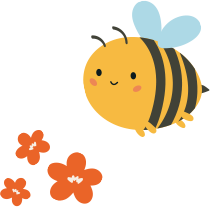Today we are talking with the amazing Edwina Fautrai, Junior UX Researcher at Sendinblue. In her interview with UXtweak Edwina shares the story of her transition to UX Research from the sales career in just 1 year, dealing with the imposter syndrome and the insides of being a person of color in UX.
Tell us a little bit more about yourself: why did you get into design, what was your background?
Before I became a UX researcher, I was a sales coordinator at Getty Images in France. Honestly I did like that job, but I was good at it and it had become pretty easy. Around the end of 2019, Getty decided to reduce their staff in most of their offices and we had two options, apply for a job in London or to be made redundant. At first I considered moving to London but then decided that it was better for me to leave. I knew that I didn’t want to keep the same job. I wanted something that matches my personality better, that challenged me, where I would get to speak to people and create.
I started to talk with people in my entourage (PM’s, Dev’s, Designers) and learned about UX Design. I realized that I had done UX design during my career whether it was at my jobs or at some side projects that I had done. So I kept on looking and found that I was really interested. Vinted was giving scholarships for tech bootcamps, so I applied. During the bootcamp I realized that research was the part that I enjoyed the most.
After passing 7 certificates with the NNGroup (UXR Specialty) at the beginning of 2021 and started applying. I got the job at Sendinblue in July and I have already learned so much about the real cycle of UXR in a company which is pretty different from what you are taught during the bootcamp.

Do you have any recommendations for people who are also transitioning to UX? What to start with and how to go with it?
UX is a nebulous topic so my very first recommendation would be to talk to people that are already in the field, they will help you have a better understanding of the domain.
Personally, talking with people who are product managers or designers, made me realize that I had practiced UX without knowing it.
If you don’t have anybody around you, take some free intro classes with the General Assembly for example. It will help you decide if you really want to go further with this.
Then get a mentor. It is life changing !
It will help you structure your transition, stay grounded and fix realistic goals.
Side note : I got a mentor (Hi Olivier !) through Black Valley (a programme dedicated to POC in tech) when I found my current position and I kinda regret not doing it earlier in my transition. Now I have another mentor (Hi Erin!) and we are looking at how I can grow and the areas that I need to work on.
Regarding the transition in itself, in my opinion it depends on your personality and learning style:
- If you are someone with a strong sense of discipline, maybe that you can self teach yourself with the help of books, articles, videos or take Google certificates.
- If you feel like you need more guidance and structure, maybe going back to school can be a good solution.
I did a bootcamp because after working for so many years I couldn’t see myself sitting in class for 1 or 2 years and I knew that I needed to have teachers to speak to, get quick feedback on my work, have my day organized for me and most importantly have deadlines.
In the end the bootcamp helped me understand what I really like about UX and it was research.
So after that I was able to focus on learning and improving my research skills.
But I want to highlight that, taking a bootcamp, getting a certificate or reading 20 books will not make you a UX professional straight away. Building your experience IS the main key.

What do you think are the main skills of a good UX researcher? Or something that you noticed helps a lot?
For me the main skill of a good UXR is empathy, you need to understand the users feelings, and observe how they share these feelings. Then of course, communication to share the voice of the users with the teams or the stakeholders.
And finally an analytical mind because there are so many insights to process so it can easily become overwhelming.
What is your favorite part of your UXR job?
My favorite part is talking to the users and learning more about them. I get to hear how they work, what matters to them, how we can help them achieve their goals, and how they use the product.
I am also super happy when I see my team members excited to do research and have the “aha” moments.
Does the Sales background help with your current occupation? Are there any specific skills you mastered then that help you do better now?
Yes, it does help.
Working in a sales team, you learn to listen to people. You have access to many insights, and you get to share these with the other teams to improve the customer experience. So I would say that it is a good first step.
Also, my background as a coordinator helped me reinforce my organization and adaptability skills, which are very important for a UX researcher role.
What is your advice for other people who are considering a career change at the moment? Where to get the courage?
Go for it! I know that when you reach a certain age, it feels like it’s too late and too risky, but you have to keep in mind that it is possible.
The courage will come from looking at the bigger picture, what you are trying to achieve, and your entourage. My friends and family were supportive throughout the whole process. They were my users during the interviews, testers when doing prototypes, and they took time to hear me vent (lol).
I promise, in the end, you will be super proud of yourself. Honestly, there is not a day when I don’t think, “Wow girl, look at what you did in 1 year! What a big change in your life.”
You mention that the real cycle of UXR in a company is pretty different from what you were taught at the bootcamp, what are the main differences you’ve noticed?
When you study UX design, you learn about a very linear process. Of course, you learn about having to iterate and sometimes starting over, but you are pretty much taught a “smooth flow”. And in the fake projects that you work on during your studies, you apply this smooth flow.
But the reality is that nothing is linear. Sometimes steps are skipped because there are some real-life constraints. Timing, release expectations, team availability, recruitment issues, etc., are all parts of a real-life study.
Do you think you’ll ever get bored of UX research like it happened with sales? Or is it unlikely? Why?
I would not say that I got bored with sales but it was more something that I did because it was convenient at some point.
I have been lucky to work different jobs throughout my career from advertising, to music publishing or coordination and what I always looked for was the variety in my tasks, in the people that I spoke to and an exciting industry.
With UXR, I can’t predict that I will never get bored, but I have found something that regroups all my criterias which wasn’t the case before.
None of my days look like the other one, I constantly learn new things (about our product, our users, methods, new tools), I feel challenged and there is joy in knowing that I participated in the release of a product that takes the users needs into account.

As a person who is just starting their UXR career, what are the main challenges you face and are there any go-to tips to deal with them?
I know it is a recurring problem for many people, but my main challenge is imposter syndrome. Thinking that I am only here because of luck, or that people don’t see me as a professional, etc…
To overcome that, I often have to remind myself that I know what I am talking about. Yes I am still in the early stages, but I’m not here by accident. So I’m learning to rely on the qualitative feedback that I get from my mentors or colleagues and I try (emphasize on try lol) to believe them!
There is also the pressure that comes with transitioning as I want it to be a success. The best go-to tip that I can give for that is to take a break to reflect and look back. Acknowledge all that you have accomplished and be proud of yourself.
How would you describe the career stage you’re currently at? And what are your plans for the future?
I would describe myself as a junior who is close to becoming a confirmed UX researcher. In the past 6 months I went from working with a senior researcher to being the only researcher to manage the projects and answer the needs of a multi squad product team. It is a temporary situation, but still it is a big challenge and I believe that it is helping me grow.
Ultimately I would like to become a more strategic researcher.
I also want to mentor women and POC that are transitioning to UX. If I am being honest, I don’t see many people that look like me when I look at product teams. So to me it is important to share knowledge, support each other and create opportunities.
What is your message to other people in the UX industry?
Let’s connect! ! Let’s be mentors for each other and inspire each other!
Read other interviews with succesful Women in UX





